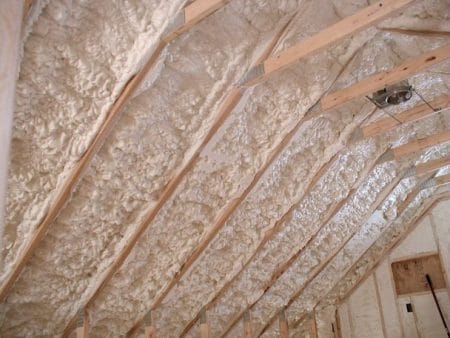Spray Foam Insulation for Buildings – Properties,Working and Benefits
Spray foam Insulation is a spray applied plastic that is used for the insulation of the buildings. A spray foam insulation is a combination of two components A and B. Where A is Isocyanate and B is a Polyol resin.
The main two characteristics of the spray foam insulation are that they resist heat transfer effectively and reduce the infiltration of air into the seam, joints, and cracks.

The two materials are heated and collected in a spray gun. The mixture is sprayed out of the spray gun during the application. The mixture reacts to become a foam and when sprayed will cover the floor, wall and the cavity areas.
The physical properties attained by a foam insulation is extraordinary that it is considered as one of the best materials that can be used to insulate home and structures.
History of Spray Foam Insulation
Before 5 decades, the increasing fuel prices was a great concern for the homeowners. They tried to use formaldehyde in order to retrofit and insulate the homes. The formaldehyde was used to fill the holes, cavities and walls with liquid formaldehyde. Once the liquid is injected, they will start to expand and fill the areas.
The use of this material soon made the homeowners to realize the health issues emitted from these. They also found that the protection provided by these materials are incomplete. The formaldehyde couldn’t fill the cavities evenly that it resulted in cold spots. The US government hence banned the use of these materials due to the health concerns it gives rise to.
Now, the product is once again in to market but the material used is Isocyanate an alternative to formaldehydes.
Working of Spray Foam Insulation
The spray foam insulation consists of materials that will change their characteristics when sprayed on the surface to be insulated. The mixture when sprayed will travel from the gun and gets heated before coming out of the gun. This heating will make the mixture to react together and become foam when applied on the surface.

The expansion of the foam will be happening within fraction of seconds. This property enables the foam insulation to cover up large areas of the commercial building very fastly within minutes. When compared to the insulation of buildings with rolls and sheets, the foam application is a better choice. The areas which are very tough to insulate with the rolls and sheets are easily accessible by the foam insulation like ceilings and attics.

The homes and building that are partially finished can be insulated with foams in their exposed areas and made usable.
Properties of Spray Foam Insulation
The major properties provided by spray foam insulation in buildings are mentioned below:
1.Energy Efficient
The phenomenon of air filtration results in the loss of energy from the building by 40%. Presence of gaps, holes and air leaking can increase the energy bills. The use of spray foam insulation will help to act as an air barrier that will close the gaps. The escape of air from the indoor of the building is prevented.
Figure -4 below shows the picture of a house completely sealed by a spray foam insulation as per the American Chemistry Council,Inc (2011).

2. Cool Roofs
Bringing cool roofs helps the house to be energy efficient. This helps to maintain a lower temperature when compared to the traditional roofs. The spray foam roofs do not demand for metal fastening thus avoiding the potential for thermal shots.
3. Strength and Durability
The spray foams help to create a strong bond that makes the roof and other components air tight avoiding the chances of water seepage. This can considerably increase the lifespan and durability of the building structure.
The bond provided by the spray foam insulation increase the resistance of the building against the uplift caused by the winds. High winds causes huge damage to roof without spray foam insulation compared with the insulated ones.
The buildings insulated with spray foam insulation can help the building prevent wetting and drying during floodwater. This hence increases the strength and the resilience of the building.
The spray foam application in the cavities helps the moisture and condensation activities to reduce thus increasing the durability of the wall systems.
Benefits of Spray Foam Insulation
The benefits of spray foam insulation are:
- Spray foam insulation is easy to install and fast.
- Bring properties equivalent to traditional insulation methods
- The application is clean and precise. No mess is left after the application of spray foam.
- Installation of foams are performed fastly by the technicians
- The spray foam insulation provides a tight energy seal with the roof or wall surface
- This insulation protects the home from humidity, pest, and rodents
- Air quality is improved reducing the indoor air pollutant level
- Roofs are made more durable by this insulation as water seepage is resisted.
- The new foam material does not contain any ozone depleting materials.
- The heating and cooling costs of the building can be reduced by 40 %.

No comments:
Post a Comment